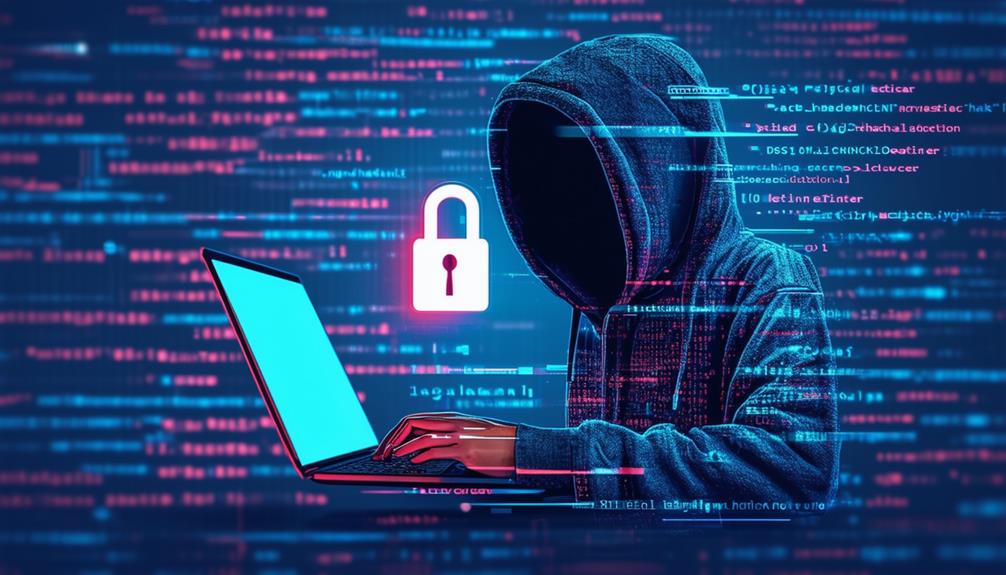Ethical hacking entails authorized system exploration to discover vulnerabilities and combat cyber threats effectively. This strategic cybersecurity practice uses penetration testing to simulate real-world attacks, identifying weaknesses before malicious hackers exploit them. Ethical hackers, equipped with tools like Nmap and Wireshark, play a crucial role in enhancing organizations' defenses by providing recommendations for risk mitigation. Through vulnerability assessments, security weaknesses are pinpointed, enabling proactive defense fortification. Understanding ethical hacking methodologies, certifications like CEH validate expertise, ensuring a proactive security culture. By delving deeper into ethical hacking, you can uncover even more insights into safeguarding digital assets.
Key Takeaways
- Ethical hacking involves authorized probing for vulnerabilities.
- Key phases include reconnaissance, scanning, enumeration, vulnerability assessment, and exploitation.
- Ethical hackers play a crucial role in identifying security weaknesses.
- Penetration testing simulates real-world cyberattacks.
- Recommendations for improvements are provided post-assessment.
The Fundamentals of Ethical Hacking
Exploring the foundational principles of ethical hacking is essential for understanding its role in modern cybersecurity practices. Ethical hacking, also known as white hat hacking, is a strategic approach to cybersecurity that involves authorized probing of systems to uncover vulnerabilities before malicious actors exploit them. This practice, often referred to as penetration testing, plays a pivotal role in strengthening digital defenses.
The fundamentals of ethical hacking lie in its proactive nature, where experts simulate real-world cyberattacks to assess system vulnerabilities. By conducting thorough reconnaissance, scanning, enumeration, vulnerability assessment, exploitation, and post-exploitation steps, ethical hackers can identify weaknesses and recommend solutions to enhance security measures.
These insider secrets allow organizations to fortify their defenses and improve their incident response capabilities, ultimately safeguarding sensitive data and critical systems from cyber threats. Ethical hacking serves as a valuable tool in the ongoing battle against cybercrime, providing a proactive defense strategy in an increasingly digital world.
Understanding Penetration Testing

Penetration testing, an essential aspect of ethical hacking, involves conducting simulated attacks to pinpoint vulnerabilities within systems. Ethical hackers, also known as penetration testers, play a vital role in identifying and addressing security weaknesses before malicious actors exploit them. These experts follow a structured approach that includes gaining access, vulnerability evaluation, and providing detailed reports to enhance cybersecurity defenses. Here is a table highlighting key aspects of penetration testing:
| Aspect | Description |
|---|---|
| Ethical Hacker on Internet | Skilled professionals conducting simulated attacks to identify system vulnerabilities. |
| Penetration Tester | Experts specialized in evaluating security weaknesses through simulated attack scenarios. |
| Vulnerability Assessment | Critical step in penetration testing to identify and prioritize weaknesses in the system. |
| Gaining Access | Process of infiltrating systems through simulated attacks to assess security measures. |
| Cybersecurity Analyst | Professionals analyzing security posture, providing insights, and recommendations for improvement. |
Key Roles of Ethical Hackers

Ethical hackers play a critical role in safeguarding organizations against cyber threats by identifying and addressing vulnerabilities in their systems.
Through the use of cybersecurity testing techniques, these professionals simulate potential attacks to assess the strength of an organization's defenses.
Hacker's Responsibilities
Responsibility is a cornerstone of the ethical hacker's role, essential for safeguarding systems and data against potential cyber threats. Ethical hackers have an important duty to identify vulnerabilities within systems to enhance cybersecurity.
By conducting penetration testing, they simulate real-world cyber threats while ensuring that legal and ethical guidelines are adhered to, preventing any harm to the systems or data. These professionals play a key role in assisting organizations in fortifying their security posture by proactively pinpointing and addressing weaknesses before malicious actors exploit them.
The primary goal of ethical hackers is to prevent cyberattacks by providing recommendations for security improvements based on their findings. Through their efforts, ethical hackers contribute significantly to the overall security of systems and networks, ultimately reducing the risk of potential breaches and data compromises.
Cybersecurity Testing Techniques
Proficient in employing advanced cybersecurity testing techniques, ethical hackers play a pivotal role in identifying and mitigating vulnerabilities within systems and networks. Through various methods such as penetration testing, ethical hackers help organizations enhance their incident response capabilities.
Key responsibilities of ethical hackers include:
- Detecting Threats: Ethical hackers simulate real-world cyber attacks to detect threats and vulnerabilities that could be exploited by malicious actors.
- Identifying Weaknesses: By conducting thorough reconnaissance, scanning, enumeration, and vulnerability assessments, ethical hackers pinpoint weaknesses in systems and networks.
- Enhancing Incident Response Capabilities: Ethical hackers provide detailed reports outlining vulnerabilities and recommendations for improving security measures. This proactive approach helps organizations strengthen their incident response capabilities and stay ahead of evolving threats.
Tools for Cyber Defense

In the domain of cyber defense, having the right tools is vital. Tools like Nmap, Wireshark, and Metasploit serve as essentials for scanning, packet analysis, and exploitation, while Security Onion provides a suite of security tools for monitoring and intrusion detection.
Understanding these cybersecurity tool essentials is key to optimizing defense systems, enhancing threat detection strategies, and ensuring a robust cyber defense posture.
Cybersecurity Tool Essentials
Effective cyber defense hinges on deploying essential cybersecurity tools that play a critical role in safeguarding networks and systems against malicious threats. These tools are vital in protecting digital assets and sensitive information from potential breaches. Ethical Hackers rely on a variety of specialized tools to enhance the security posture of organizations.
Some key cybersecurity tool essentials include:
- Nmap: A powerful tool for network discovery that helps in identifying hosts and services on a network.
- Metasploit: Widely used for penetration testing, it aids in identifying and exploiting vulnerabilities to strengthen defenses.
- Wireshark: Essential for network analysis, it allows security professionals to capture and analyze network traffic for potential security issues.
Threat Detection Strategies
Cyber defense against potential threats entails the strategic utilization of advanced tools for threat detection, which are essential components in safeguarding networks and systems.
Various threat detection tools play an important role in identifying and mitigating cyber threats effectively. Security information and event management (SIEM) solutions enable real-time monitoring and analysis of security events, detecting anomalies that could indicate potential breaches.
Network scanning tools like Nmap and Wireshark are instrumental in identifying vulnerabilities and unauthorized activities within a network, aiding in preemptive security measures.
Endpoint detection and response (EDR) tools provide visibility into endpoint activities, enhancing the ability to detect and respond to security incidents promptly.
By leveraging these tools, organizations can strengthen their defense mechanisms against cyber threats, ensuring the security and integrity of their systems.
Ethical hacking practices often involve the utilization of these tools to proactively identify vulnerabilities and enhance overall cybersecurity posture.
Defense System Optimization
Utilizing a combination of sophisticated defense tools is essential for optimizing the security posture of digital systems against potential cyber threats. To enhance cyber defense, organizations can employ a variety of tools:
- Vulnerability Scanners: Tools like Nessus and Qualys are pivotal for identifying weaknesses in systems and applications, allowing proactive patching before exploitation occurs.
- SIEM Tools: Security Information and Event Management platforms such as Splunk and LogRhythm help in monitoring and analyzing security events across an organization's network, enabling quick response to potential threats.
- Endpoint Protection Solutions: Antivirus programs and Endpoint Detection and Response (EDR) tools provide a layer of defense for individual devices, safeguarding them against malware and unauthorized access attempts.
Importance of Vulnerability Assessment

Vulnerability assessment plays a pivotal role in ethical hacking by pinpointing potential weaknesses within systems and networks. By conducting thorough vulnerability assessments, ethical hackers can identify the vulnerabilities that malicious actors could exploit to breach security measures. This proactive approach allows organizations to understand their systems' weak points and take necessary actions to fortify their defenses against cyber threats.
To further illustrate the importance of vulnerability assessment, consider the following table:
| Importance of Vulnerability Assessment |
|---|
| Identifies Weaknesses in Systems |
| Pinpoints Vulnerabilities in Networks |
| Mitigates Potential Cyber Threats |
This table showcases how vulnerability assessments help in recognizing weaknesses within systems, pinpointing vulnerabilities in networks, and ultimately mitigating potential cyber threats. Regular assessments enable organizations to stay ahead of cybercriminals by addressing vulnerabilities before they can be exploited.
Mitigating Cybersecurity Risks

Mitigating cybersecurity risks involves implementing robust risk assessment strategies and maintaining effective security vulnerability management practices.
By proactively identifying and addressing vulnerabilities, organizations can strengthen their defenses against potential cyber threats.
Regular evaluation and remediation efforts are essential components of a thorough cybersecurity risk mitigation plan.
Risk Assessment Strategies
Effective risk assessment strategies in ethical hacking involve the meticulous identification and evaluation of potential threats and vulnerabilities within a system. Ethical hackers meticulously analyze security controls, scrutinize the potential impacts of cyber risks, and prioritize mitigation efforts to enhance overall security.
To conduct thorough risk assessments, ethical hackers must:
- Understand the organization's assets: Knowing what assets are valuable to the organization helps in prioritizing protection efforts.
- Analyze the threat landscape: Identifying potential threats such as malware, phishing attacks, or insider threats is critical for preemptive security measures.
- Assess the security posture: Evaluating the current security measures in place helps in understanding the robustness of the defense mechanisms against potential risks.
Security Vulnerability Management
Proactive identification and management of security weaknesses are essential components of safeguarding systems against cyber threats. Security vulnerability management involves the systematic process of identifying, prioritizing, and addressing vulnerabilities to mitigate cybersecurity risks effectively.
Ethical hackers, also known as white-hat hackers, play an important role in this process by ethically exploiting systems to uncover potential weaknesses before malicious actors can leverage them for nefarious purposes.
Regular vulnerability assessments are essential for organizations to stay ahead of evolving cyber threats and maintain a strong security posture. By mitigating cybersecurity risks through robust vulnerability management practices, businesses can greatly reduce the likelihood of data breaches and financial losses.
Ethical hacking practices are increasingly relied upon by organizations to enhance their defenses and safeguard sensitive information from cyber threats, ultimately bolstering their overall security posture in the ever-evolving digital landscape.
Ethical Hacking Methodologies

Ethical hacking methodologies encompass a systematic approach to identifying and addressing security vulnerabilities in target systems to enhance overall cyber defense strategies. Ethical hackers follow a structured process that includes:
- Reconnaissance: This initial phase involves gathering information about the target system to understand its architecture, potential entry points, and security measures in place.
- Scanning: Ethical hackers utilize specialized tools to scan the target system for vulnerabilities and weak points that could be exploited.
- Exploitation: After identifying vulnerabilities, ethical hackers attempt to exploit them to gain unauthorized access to the system for investigative purposes.
These steps are essential in the ethical hacking process as they allow professionals to simulate real-world cyber attacks, identify weaknesses, and help organizations strengthen their defenses against malicious threats.
Reporting and Remediation Strategies

One critical aspect of enhancing cybersecurity measures in organizations involves the meticulous implementation of reporting and remediation strategies based on findings from ethical hacking assessments.
Ethical hackers play an essential role in identifying vulnerabilities within systems and networks, providing detailed reports that outline these weaknesses along with recommendations for bolstering security measures.
Organizations, in turn, prioritize these recommendations and implement necessary fixes to address the identified vulnerabilities effectively.
Compliance and Regulatory Considerations

Compliance with legal requirements and industry standards is paramount in the domain of ethical hacking to guarantee the integrity and legality of cybersecurity assessments. When engaging in ethical hacking activities, organizations must adhere to a variety of regulations to safeguard the proper conduct of their operations.
Some key considerations include:
- Following guidelines such as GDPR, HIPAA, and PCI DSS to protect sensitive data and maintain privacy standards.
- Obtaining proper authorization and permissions before conducting penetration testing to adhere to regulatory requirements.
- Maintaining thorough documentation of all ethical hacking activities to establish an audit trail and ensure regulatory compliance.
Non-compliance with these regulations can have serious consequences, including severe penalties, fines, and reputational damage for businesses. By prioritizing compliance and regulatory considerations, ethical hackers can conduct their assessments with integrity and in a legally sound manner.
Building Trust Through Ethical Hacking

In the domain of cybersecurity, fostering trust with stakeholders is a vital outcome of leveraging ethical hacking practices. Organizations utilize ethical hacking to build trust with customers and partners by proactively identifying and addressing vulnerabilities that could compromise sensitive information.
By engaging with ethical hackers, companies showcase a commitment to cybersecurity and safeguarding data, instilling confidence in their ability to protect valuable assets.
Ethical hacking plays an essential role in allowing for the early detection of security weaknesses, thereby reducing the risk of data breaches and financial losses. The detailed reports provided by ethical hackers outline vulnerabilities and offer practical recommendations for enhancing security measures.
Regular assessments conducted by ethical hackers enable organizations to stay ahead of evolving cyber threats and maintain compliance with regulatory standards, further solidifying trust with stakeholders.
Ultimately, ethical hacking serves as a cornerstone in establishing and maintaining a secure and trustworthy digital environment for all parties involved.
Frequently Asked Questions
What Is Ethical Hacking in Simple Words?
Ethical hacking is the practice of legally and ethically probing systems for vulnerabilities to enhance cybersecurity defenses. It involves simulating cyber threats to identify weaknesses, using specialized tools and methodologies to fortify digital infrastructure and prevent data breaches.
What Are the 5 Stages of Ethical Hacking?
The 5 stages of ethical hacking are Reconnaissance, Scanning, Gaining Access, Maintaining Access, and Covering Tracks. These key phases involve systematically probing and testing systems to identify vulnerabilities, gain entry, and secure access for investigative purposes.
What Is Ethical Hacker Salary?
Ethical hacker salaries in the United States can range from $80,000 to $130,000 annually. Certifications like CEH often lead to higher pay. Specialized skills such as penetration testing can fetch salaries surpassing $150,000.
What Do Ethical Hackers Need to Know?
To excel in ethical hacking, professionals must grasp network security, penetration testing, and automated tools. Proficiency in reconnaissance, scanning, access, persistence, and covering tracks is crucial. Ethical hackers bolster cybersecurity by mimicking real threats and providing actionable insights.
Conclusion
In summary, ethical hacking is an essential tool in protecting against cyber threats. By understanding the fundamentals, utilizing key methodologies, and employing the right tools, organizations can enhance their cyber defenses and build trust with their stakeholders.
The importance of vulnerability assessment and reporting strategies cannot be overstated in maintaining a secure digital environment. Compliance with regulations and regulations is also vital in ensuring the integrity of cybersecurity practices.
Stay informed, stay vigilant, and stay secure.









